Reddit and Scaling Laws
Different people have different hobbies. Mine are coffee, running, and finding patterns in how firms scale (don’t judge). But very seldom do I find myself discussing all of them in the same article.
Reddit went public last week, and an intriguing aspect of the IPO is the opportunity to retrospectively analyze the data, offering us insights into how the company has scaled.
We’ve all heard how social networks are special since they possess network effects and thus, their value scales faster than their user base. So if a social network can successfully derive value from its users through monetization strategies, it can potentially increase its revenue faster than its costs. Assuming that costs (in particular, customer acquisition costs) grow proportionally with the number of users, this would suggest that the company is scaling effectively.
My goal in today’s article is to focus on the revenue side and understand how it scales.
Network Effects
While there are various types of scaling laws related to networks, Metcalfe’s Law is one of the most well-known. Stemming from the fact that the number of connections in a network is n * (n-1)/2, Metcalfe’s law suggests that the value of a network increases in proportion to the square of the number of its users (n^2).
This implies that as the user base (n) expands, the network’s value per user should ideally increase linearly, meaning the revenue (or the value derived from each user) grows at a steady, linear rate.
Here is a graphical illustration:
What makes Reddit intriguing is its ability to monetize its sub-communities (subreddits in the Reddit jargon) and not just the users themselves. This suggests a dynamic where, as the number of users increases, so does the number of communities they belong to, a phenomenon known as Reed’s Law.
Reed’s Law posits that the number of communities one can belong to grows exponentially with the number of users, essentially following a pattern of 2 to the power of n, indicating a combinatorial increase relative to the user base.
Here is a graphic illustration:
When sub-communities are monetized linearly (say by allowing brands to target subreddits and charge them accordingly), one would expect growth that significantly surpasses linear rates.
Reed’s Law always felt aspirational, but over the years, people have started saying that Metcalfe’s Law is wrong. The main claim of the authors of this paper is that the right model is one of n*log(n).
Their analysis identifies a flaw in the assumptions of network valuation laws like Metcalfe’s and Reed’s, which equate the value of all connections or groups within a network. This flaw echoes the skepticism Henry David Thoreau expressed in his critique of superficial connectivity within America’s inaugural large-scale telecommunications network in "Walden." For example, he poignantly highlighted the potential lack of meaningful communication between distant points, such as Maine and Texas, despite the haste in establishing a telegraph connection between them.
According to the author, the value an individual derives from a network is more accurately represented by the cumulative sum of the reciprocal values of all other network members, closely approximating log (n). This model suggests that the total value for all network participants escalates about n*log (n), offering a more nuanced perspective on network valuation.
Subreddits and Social Curation
But before we delve deeper, it’s worth discussing subreddits, which present an interesting aspect of Reddit's structure. The core of this interest lies in the concept of curation, which uniquely combines algorithmic selection with community-led moderation. This approach fosters a sense of social connectivity among users and serves as a prime illustration of the platform’s distinctive model.
Let me explain:
Reddit’s front-page design resembles Facebook: there’s a personalized feed of posts that are primarily influenced by the subreddits you’ve joined, and there are suggestions for additional content and communities that might interest you. The algorithm prioritizes new and engaging content from within the subscribed subreddits, making sure users are alerted to fresh discussions and updates across different areas of the platform. This approach enhances user engagement by carefully selecting content that aligns with individual interests and introduces them to new topics and communities of interest.
All this is done algorithmically with the primary benefit of algorithmic curation, as opposed to editorial curation, being its scalability, and the ability to offer highly personalized content. Editorial curation involves an individual curating content manually, similar to deciding what’s going to appear on the editorial page of the New York Times.
Reddit, however, introduces an additional layer of curation: Social Curation.
Social curation within Reddit operates at the subreddit level, where a group of moderators establishes the community’s rules and actively works to ensure that posts comply with these guidelines. This process involves community-led oversight and contributes to maintaining the integrity and relevance of content within each subreddit.
For example, below are the rules of the r/espresso subreddit.
Just to be clear: “This is sub is focused on coffee prepared as espresso using manual and semiautomatic methods. Non-espresso brewing methods (e.g., pourover, Aeropress, Nespresso)are not appropriate.”
The mods will quickly remove any post that doesn’t abide by these rules.
If, for instance, you submit a race report in the r/AdvancedRunning subreddit without including detailed information about what occurred at mile 23, your post will be removed for lacking sufficient details (don’t ask how I know).
While this seems a bit harsh, the thoroughness with which these rules are enforced is what makes these subreddits successful.
It allows someone participating in the U.S. Olympic Marathon trials to post a detailed report of the race or to write a detailed post on how they adopted the new Norwegian Double Threshold method to the Marathon, starting a passionate and informed discussion.
Facebook, which also uses algorithms to curate group content, lacks the social curation aspect so I don’t see quality posts of this type. Now, I’m sure some groups on Reddit (probably the largest ones) have less social curation, but I still find that this aspect of Reddit is what makes it so informative—something I can’t say about any other social network.
Scaling Reddit
Let’s examine the system’s growth dynamics.
The initial observation reveals that the number of monthly active users is increasing, but not exponentially. Instead, the growth rate is slightly above linear, specifically polynomial, with a degree of two. This indicates a growth pace that is modestly quicker than linear yet definitely slower than exponential.
When examining the revenue per monthly active user, it’s noted that information on Daily Active Users (DAU) has been unavailable for more than three years now, necessitating reliance on monthly active user (MAU) data. However, it’s reasonable to assume that the DAU/MAU ratio (which some use as an indicator of user engagement or stickiness) remains relatively stable.
The observed data indicate that the company is experiencing growth, with revenue per MAU increasing, which then yields a path to profitability:
To provide some context as to what you should expect, if Reddit was analogous to a car company, such revenue metrics should remain constant due to the nature of physical product sales.
In contrast, Metcalfe’s law would predict a linear increase (since the revenues should grow with n^2). However, the growth rate exceeds linear expectations but doesn’t accelerate at the rate predicted by Reed’s law, which would suggest a much more rapid increase (2^n).
Nevertheless, growth remains slightly above a linear rate, which also means that it’s faster than log (n).
One may argue that we are comparing two distinct periods: the old Reddit (until 2018), which was more focused on subreddits (the feed was less important) and exerted less effort on monetization, and the New Reddit (after 2018).
So I tried to fit a piece-wise linear model, and while a slightly worse fit, not much less so:
So it’s possible that what we see in reality is two different Metcalfe Laws but with different monetization mechanisms. But we (meaning the public) don’t have enough data to decide unequivocally which is a better model.
Digging deeper, we can see that the revenue per subreddit is indeed experiencing growth, with a notable pattern of increasing quadratically.
Again, one may suggest fitting a piece-wise linear model to the graph, but I don’t see much of an argument here since the fit is good from the beginning. Still, time will tell. The argument for revenue per subreddit is that this is the mechanism the firm uses to sell ads, but that the value of a subreddit (or some subreddits) is possibly increasing due to the density (hence engagement) of these communities.
An intriguing observation here is that the number of subreddits is increasing linearly with the number of users. Only linearly!
This scenario is quite interesting because it prompts us to question the underlying cause of the trend.
One thing is clear: Reed’s Law, which claims that users create or join sub-communities in a combinatorial fashion that can subsequently be monetized, doesn’t hold for Reddit.
Growth Drivers at Reddit
So, this begs the question of what drives growth at Reddit.
The correlation between revenue per subreddit and the number of subreddits presents a more accurate fit than the model that correlates revenue per user with the number of users. While not overwhelmingly significant, the difference is notable. This suggests that revenue is closely linked to the number of subreddits, indicating a strong dependency on the platform’s diversity and range of communities.
We could also imagine a different path toward growth: the firm acquires users who come together, and who, over time, create more interesting, monetized subreddits. This would indicate that the growth of both users and subreddits is tightly coupled.
A more compelling story would be that the same users keep creating and joining new subreddits, which are then monetized.
While I’m almost certain that both scenarios occur, it’s clear that the latter occurs only marginally, at least when it comes to monetization. For example, I’ve joined many new subreddits over time, but the data isn’t clear regarding the financial outcome, and this raises the question: What’s the constraint?
Are we looking at a demand-driven situation where new users bring specific interests that lead to the creation of new subreddits? Or is it a case where there’s a constraint on the supply side where the availability and/or disposition of content creators and moderators act as the limiting factor for the system’s value expansion?
I think the observation that the number of subreddits doesn’t grow exponentially with the number of users indicates a supply constraint. Specifically, it suggests a limitation in the number of moderators available to oversee content, moderate these subreddits, and introduce new ideas, revealing a bottleneck in the platform’s expansion.
Of course, one may suggest that the problem lies in the scarcity of interesting topics, but I don’t think that’s it. There’s a subreddit dedicated to people running their first marathon —a topic which can easily be expanded. Why not create one for the second marathon, for example? Why not one for the last marathon? Why not create a subreddit for all Barkley Marathon finishers? You can see where I’m going with this.
So in light of these observations, and given that Reddit’s business model involves monetizing subreddits, a pertinent discussion for the company might be focused on encouraging more users to create subreddits. However, a significant aspect of this debate touches upon the sentiment among power users feeling overlooked by the company’s IPO. If this sentiment holds, it could present challenges for Reddit, which relies heavily on user engagement and content creation.
Perhaps the primary challenge is that many of us are not skilled content creators, and finding individuals who are willing to generate, and moderate content comes with its own set of challenges. A significant part revolves around the discussion that these contributors are often not compensated for their efforts. This highlights the complex dynamics of volunteer-based content creation and moderation within communities, where motivation and sustainability become key concerns.
Perhaps Reddit should consider compensating those who create and moderate content or at least make the process more rewarding to encourage content creation. However, part of the platform’s charm may be that groups are formed purely from genuine interest rather than financial incentives. The essence of community-driven engagement, where passion rather than profit drives participation, might be at risk if financial compensation becomes a central aspect of content creation and moderation, possibly resulting in the authenticity of the platform being compromised.
As an avid Reddit user, observing this evolution over the last several years is like watching your favorite indie band go mainstream: you’re proud and a tad nostalgic, but you keep wondering whether they’ll continue playing their old hits or start chasing after new audiences.


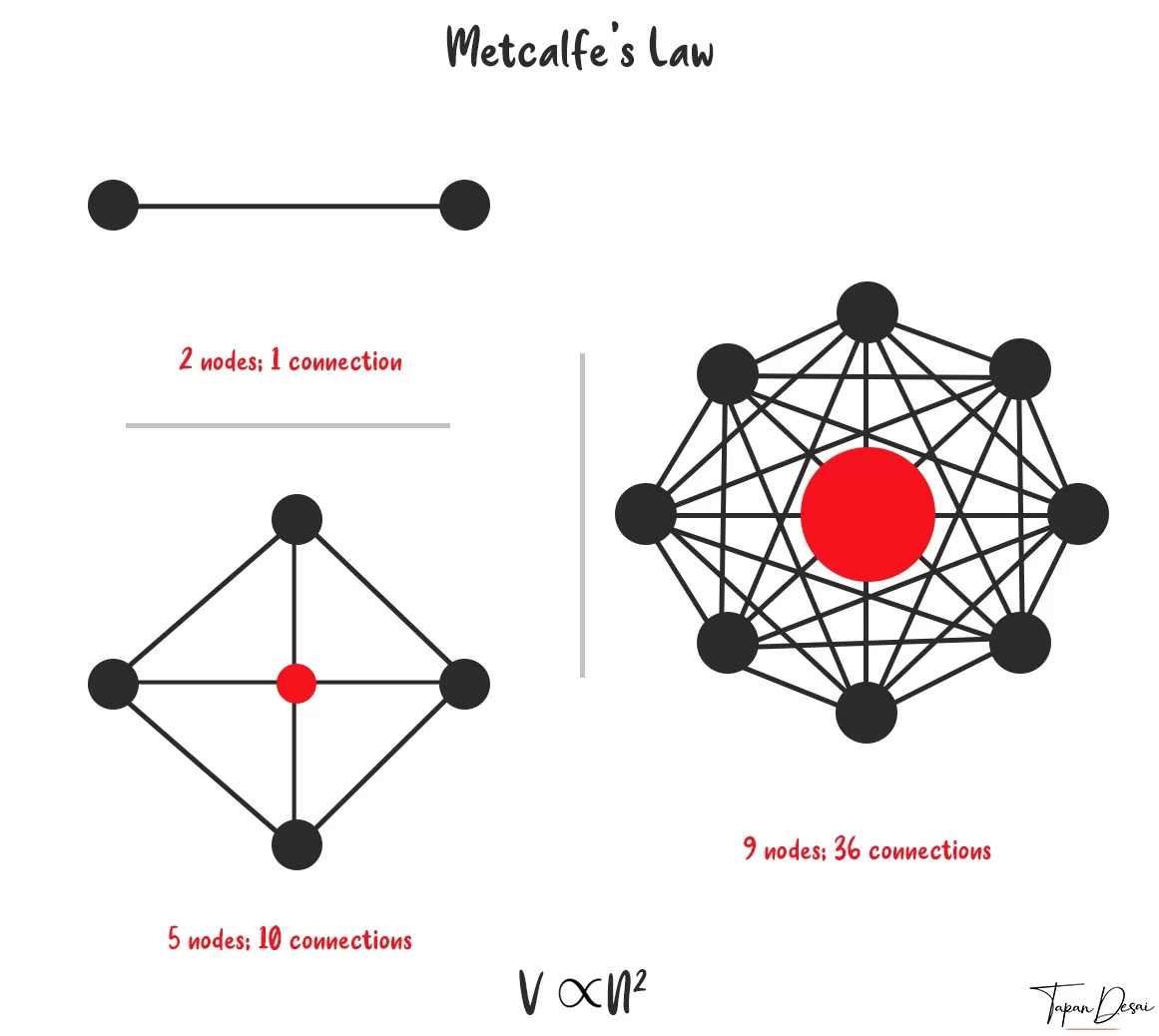
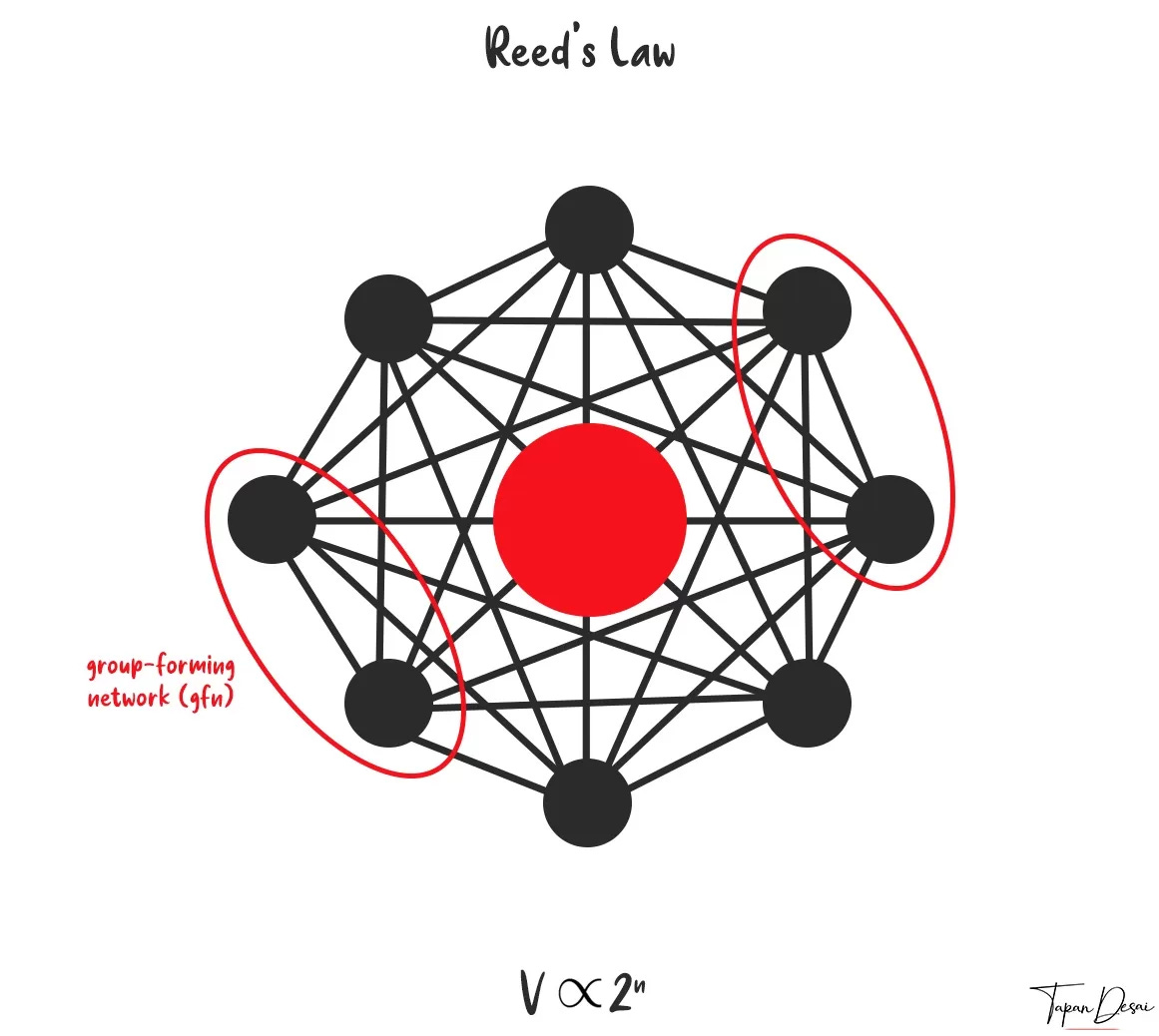
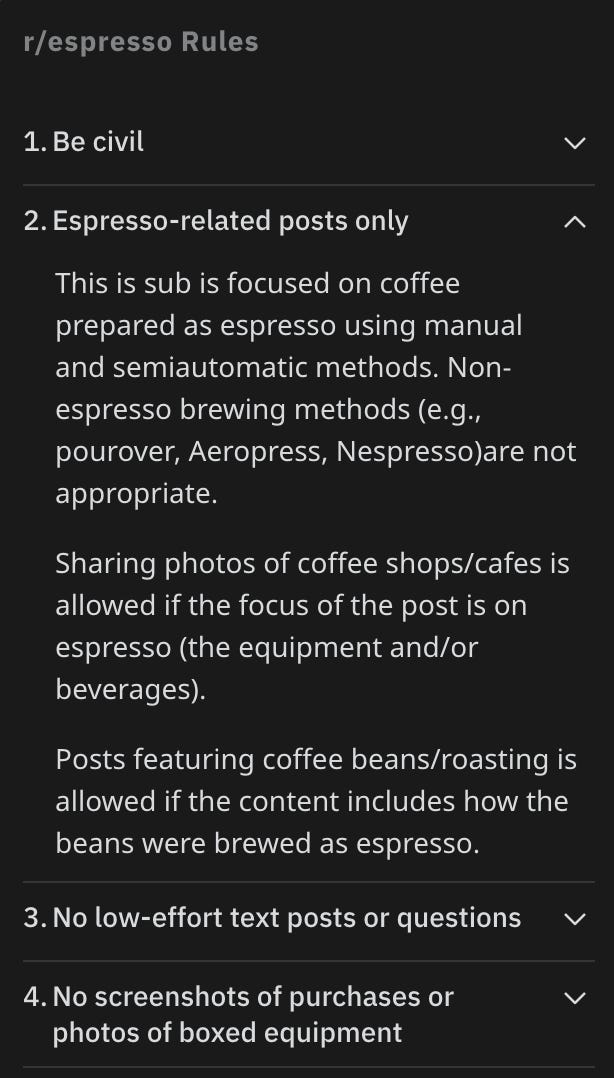
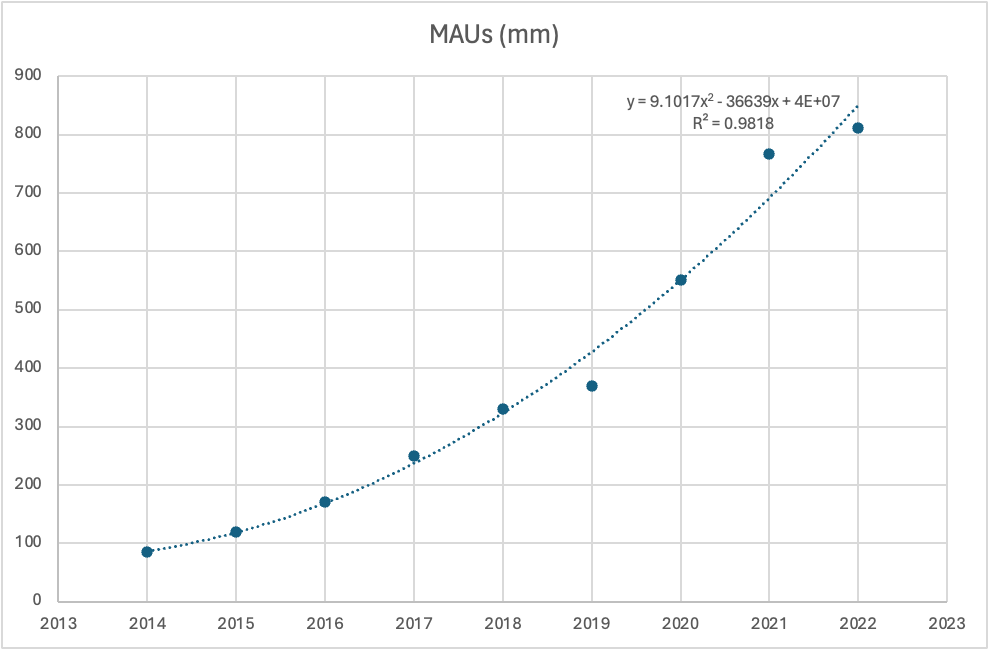
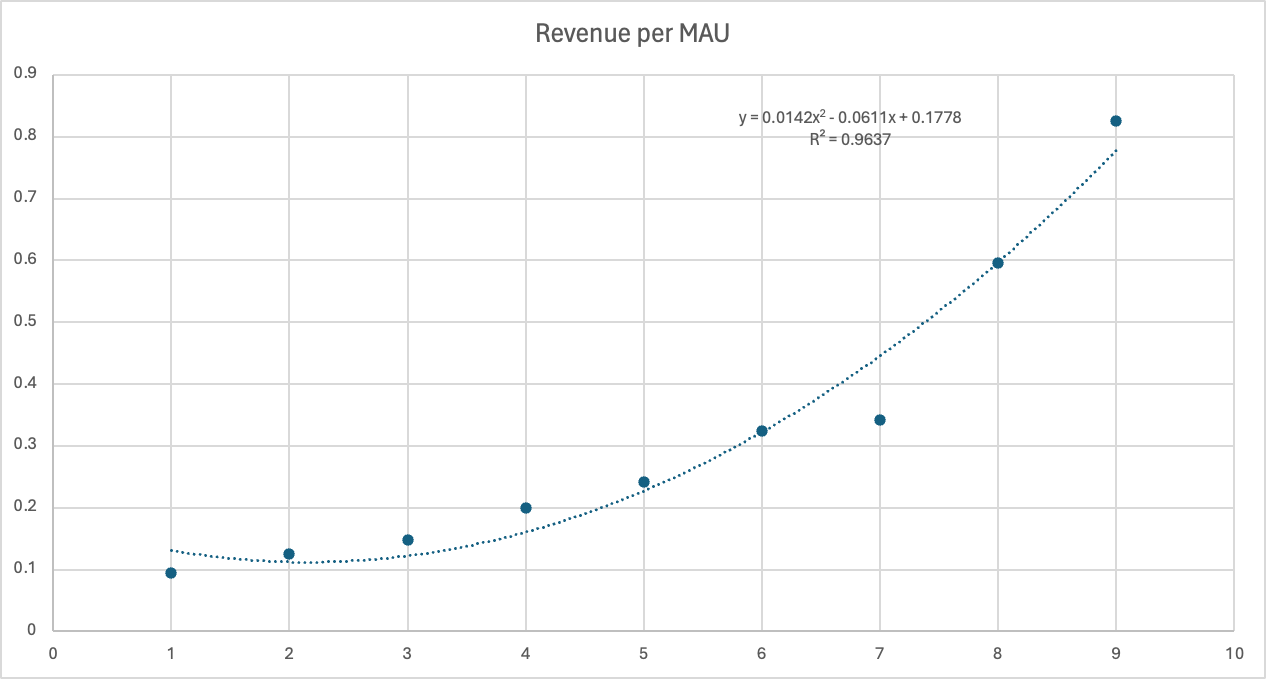

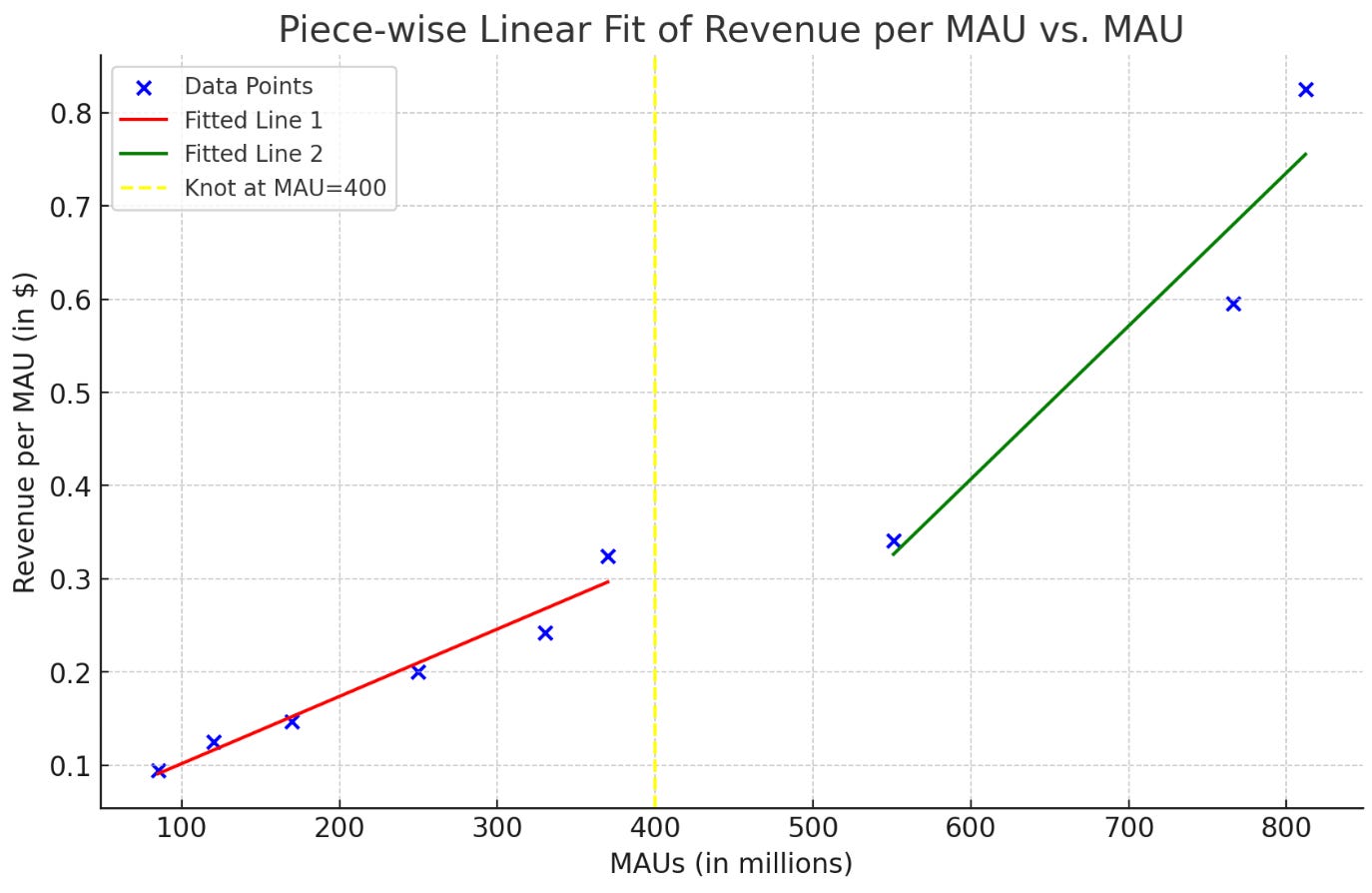
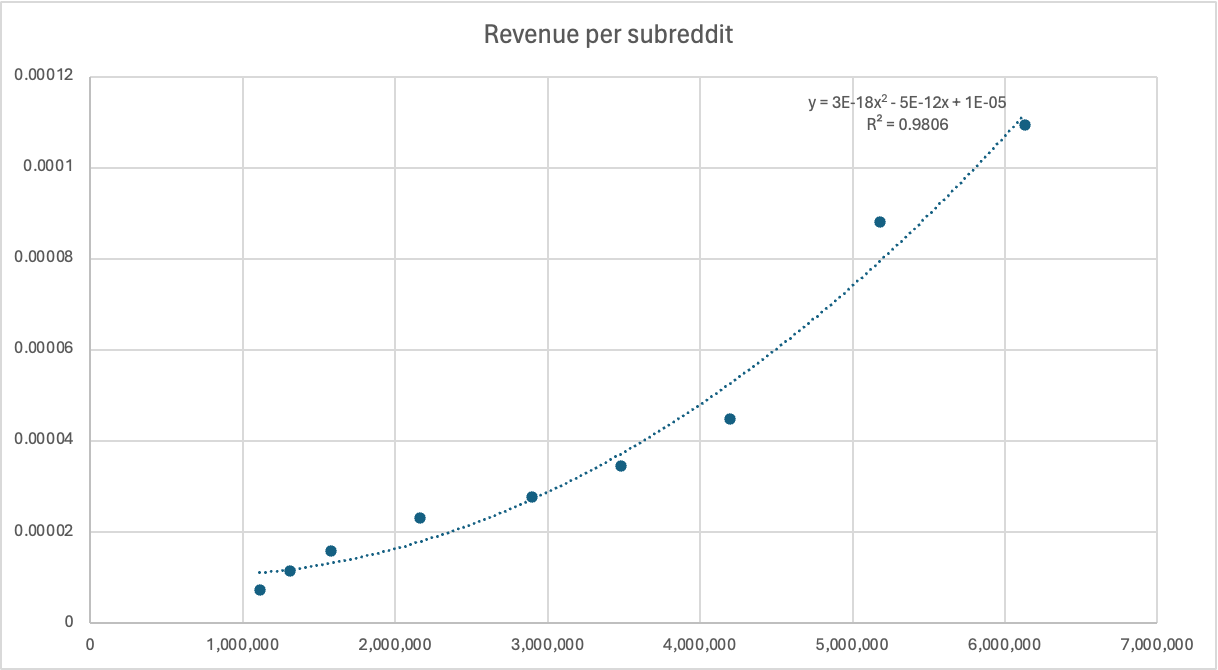
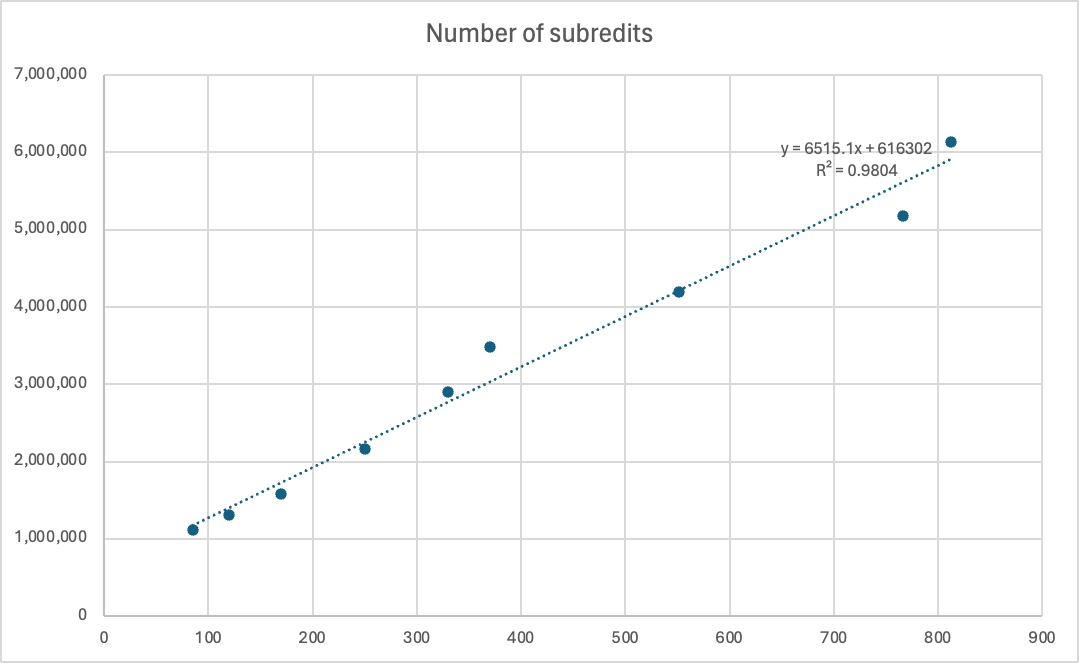
FWIW - at my last startup I looked at using Reddit's ad product to target sub-reddits relevant to our product. Reddit would not let me target sub-reddits with below a certain threshold of members.
While something they control and therefore could adjust, this also points to the constraint not just being number of sub-reddits, but number of sufficiently large sub-reddits. That also runs counter to being to target those smaller, but higher potential communities with a positive CAC over a more generic and diluted audience.
Interesting to note that Reddit's DAU/MAU ratio ( 8-9 %) is significantly less than the standard for social media companies like IG/Snap (20-30%) - https://www.businessofapps.com/data/reddit-statistics/
Do you think the constraint for growth could be building in enough viral loops for users to visit Reddit more frequently? Resulting in being able to charge higher CPM/CPC rates?
Also given the edgy nature of Reddit's content & user-base along with pseudonymity probably makes it less attractive for traditional advertisers